MGBBT0UCT: Micro & Macro Aspects of Understanding Customers Essay
VerifiedAdded on 2023/06/17
|8
|2177
|75
Essay
AI Summary
This essay explores the critical aspects of understanding customer behavior in tourism and business management, differentiating between micro and macro factors that influence consumer decisions. The micro factors discussed include customer values and beliefs, self-concept and personality, satisfaction, motivation (analyzed through Maslow's hierarchy), trust and loyalty, and lifestyle. The macro factors examined are technological, psychological, sociological, and cultural aspects. Real-world examples, such as the strategies employed by London tourism and Hilton and Marriott Hotels, illustrate these concepts. The essay emphasizes the importance of understanding these factors for effective marketing and service delivery in the tourism sector, enabling businesses to meet customer needs and foster lasting relationships. The document is available on Desklib, a platform offering a wide range of study tools and resources for students.
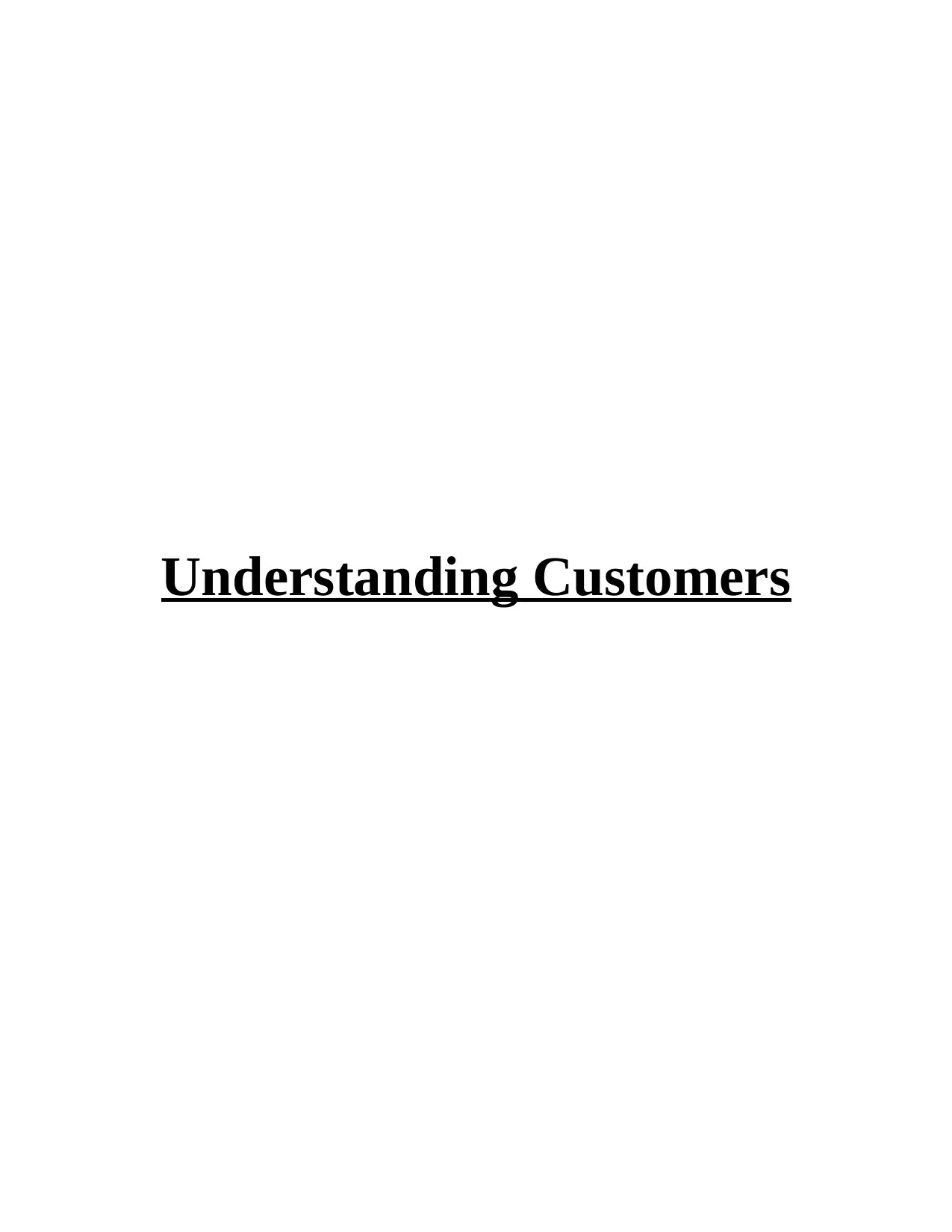
Understanding Customers
Paraphrase This Document
Need a fresh take? Get an instant paraphrase of this document with our AI Paraphraser
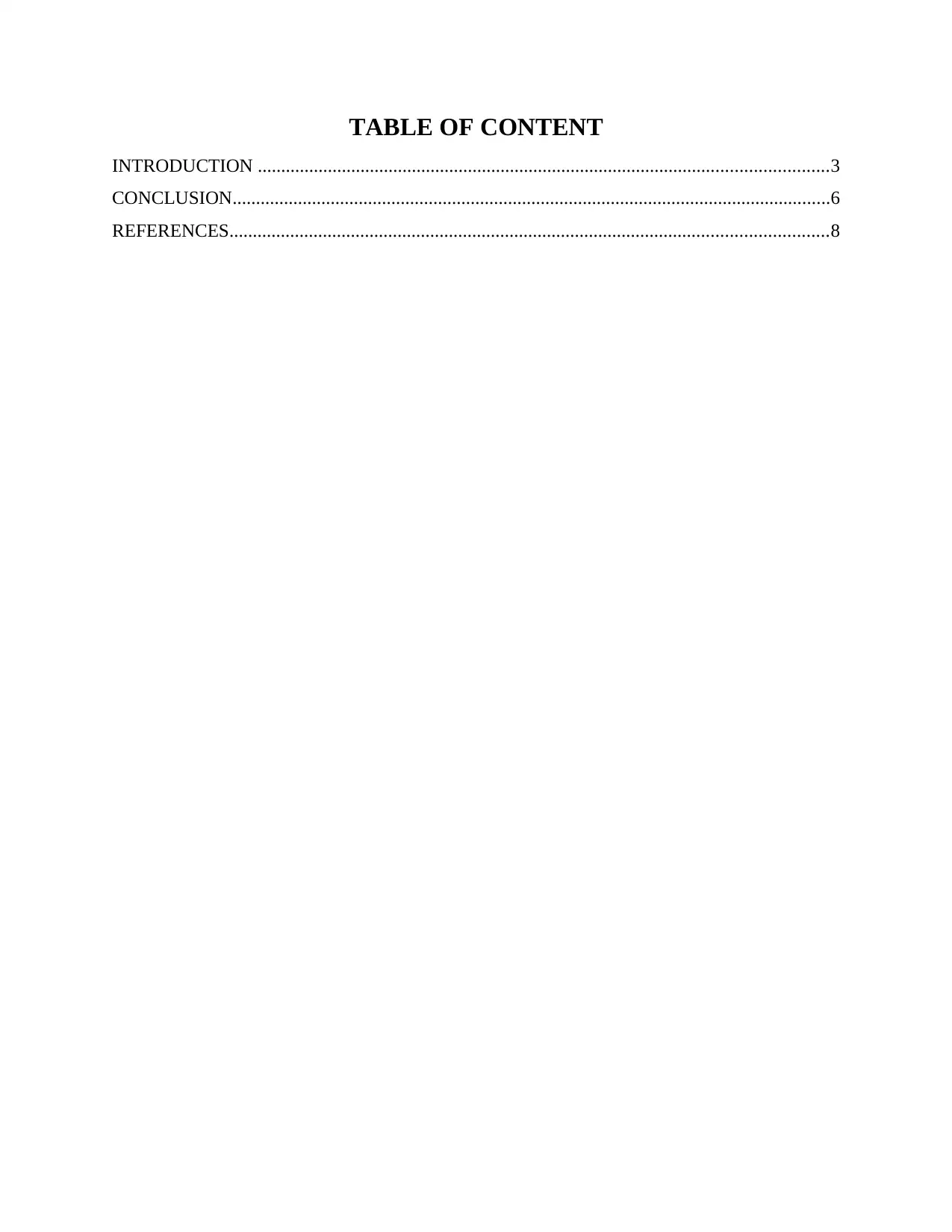
TABLE OF CONTENT
INTRODUCTION ..........................................................................................................................3
CONCLUSION................................................................................................................................6
REFERENCES................................................................................................................................8
INTRODUCTION ..........................................................................................................................3
CONCLUSION................................................................................................................................6
REFERENCES................................................................................................................................8
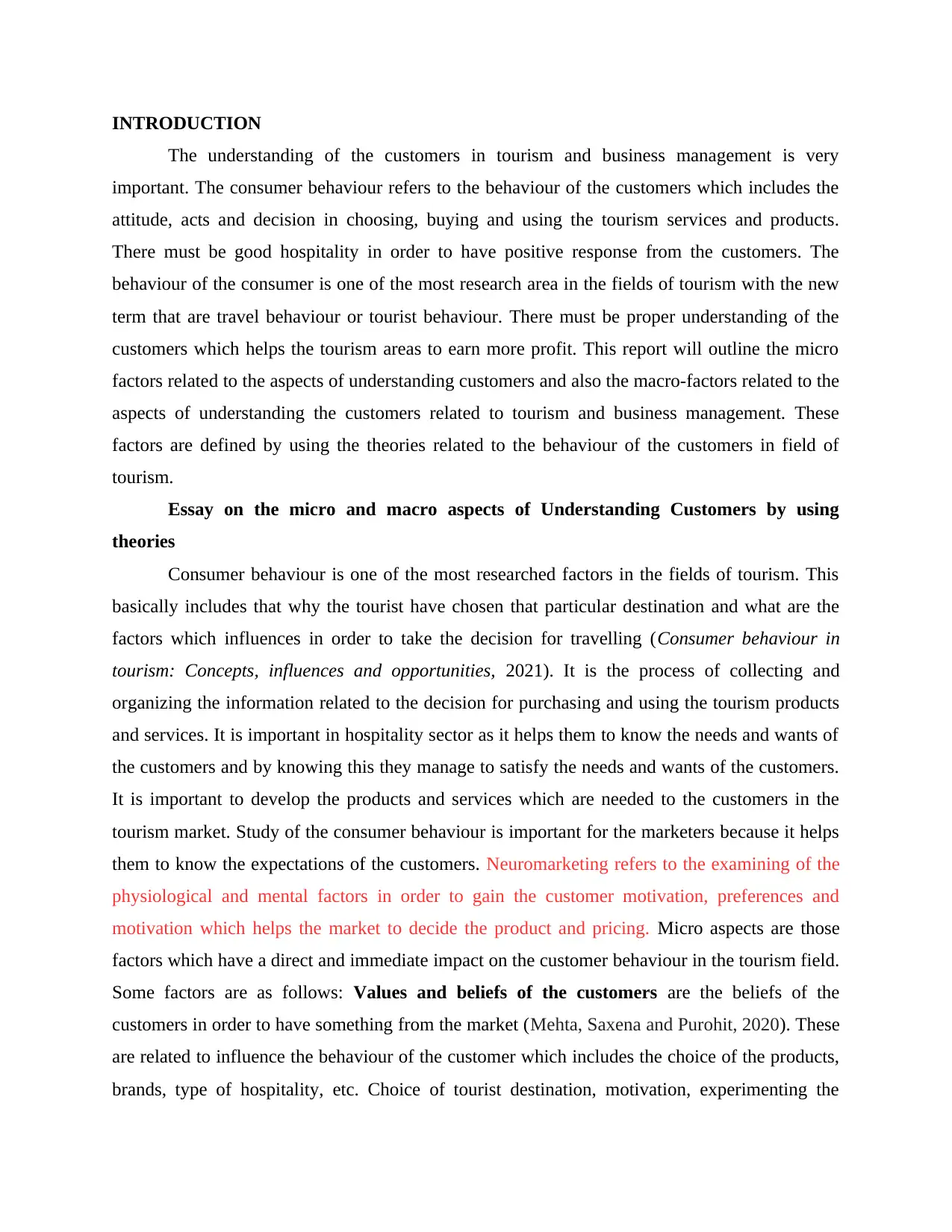
INTRODUCTION
The understanding of the customers in tourism and business management is very
important. The consumer behaviour refers to the behaviour of the customers which includes the
attitude, acts and decision in choosing, buying and using the tourism services and products.
There must be good hospitality in order to have positive response from the customers. The
behaviour of the consumer is one of the most research area in the fields of tourism with the new
term that are travel behaviour or tourist behaviour. There must be proper understanding of the
customers which helps the tourism areas to earn more profit. This report will outline the micro
factors related to the aspects of understanding customers and also the macro-factors related to the
aspects of understanding the customers related to tourism and business management. These
factors are defined by using the theories related to the behaviour of the customers in field of
tourism.
Essay on the micro and macro aspects of Understanding Customers by using
theories
Consumer behaviour is one of the most researched factors in the fields of tourism. This
basically includes that why the tourist have chosen that particular destination and what are the
factors which influences in order to take the decision for travelling (Consumer behaviour in
tourism: Concepts, influences and opportunities, 2021). It is the process of collecting and
organizing the information related to the decision for purchasing and using the tourism products
and services. It is important in hospitality sector as it helps them to know the needs and wants of
the customers and by knowing this they manage to satisfy the needs and wants of the customers.
It is important to develop the products and services which are needed to the customers in the
tourism market. Study of the consumer behaviour is important for the marketers because it helps
them to know the expectations of the customers. Neuromarketing refers to the examining of the
physiological and mental factors in order to gain the customer motivation, preferences and
motivation which helps the market to decide the product and pricing. Micro aspects are those
factors which have a direct and immediate impact on the customer behaviour in the tourism field.
Some factors are as follows: Values and beliefs of the customers are the beliefs of the
customers in order to have something from the market (Mehta, Saxena and Purohit, 2020). These
are related to influence the behaviour of the customer which includes the choice of the products,
brands, type of hospitality, etc. Choice of tourist destination, motivation, experimenting the
The understanding of the customers in tourism and business management is very
important. The consumer behaviour refers to the behaviour of the customers which includes the
attitude, acts and decision in choosing, buying and using the tourism services and products.
There must be good hospitality in order to have positive response from the customers. The
behaviour of the consumer is one of the most research area in the fields of tourism with the new
term that are travel behaviour or tourist behaviour. There must be proper understanding of the
customers which helps the tourism areas to earn more profit. This report will outline the micro
factors related to the aspects of understanding customers and also the macro-factors related to the
aspects of understanding the customers related to tourism and business management. These
factors are defined by using the theories related to the behaviour of the customers in field of
tourism.
Essay on the micro and macro aspects of Understanding Customers by using
theories
Consumer behaviour is one of the most researched factors in the fields of tourism. This
basically includes that why the tourist have chosen that particular destination and what are the
factors which influences in order to take the decision for travelling (Consumer behaviour in
tourism: Concepts, influences and opportunities, 2021). It is the process of collecting and
organizing the information related to the decision for purchasing and using the tourism products
and services. It is important in hospitality sector as it helps them to know the needs and wants of
the customers and by knowing this they manage to satisfy the needs and wants of the customers.
It is important to develop the products and services which are needed to the customers in the
tourism market. Study of the consumer behaviour is important for the marketers because it helps
them to know the expectations of the customers. Neuromarketing refers to the examining of the
physiological and mental factors in order to gain the customer motivation, preferences and
motivation which helps the market to decide the product and pricing. Micro aspects are those
factors which have a direct and immediate impact on the customer behaviour in the tourism field.
Some factors are as follows: Values and beliefs of the customers are the beliefs of the
customers in order to have something from the market (Mehta, Saxena and Purohit, 2020). These
are related to influence the behaviour of the customer which includes the choice of the products,
brands, type of hospitality, etc. Choice of tourist destination, motivation, experimenting the
⊘ This is a preview!⊘
Do you want full access?
Subscribe today to unlock all pages.

Trusted by 1+ million students worldwide
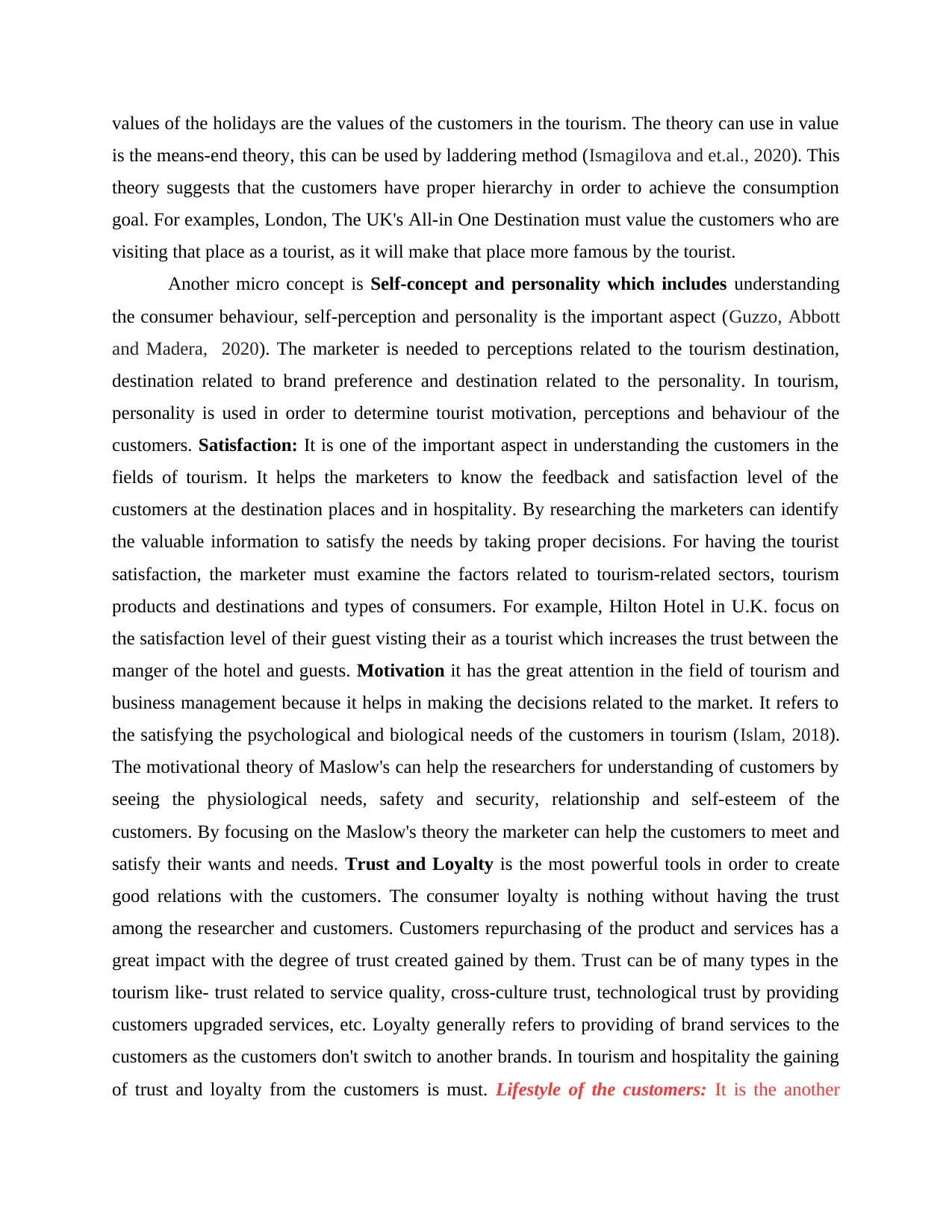
values of the holidays are the values of the customers in the tourism. The theory can use in value
is the means-end theory, this can be used by laddering method (Ismagilova and et.al., 2020). This
theory suggests that the customers have proper hierarchy in order to achieve the consumption
goal. For examples, London, The UK's All-in One Destination must value the customers who are
visiting that place as a tourist, as it will make that place more famous by the tourist.
Another micro concept is Self-concept and personality which includes understanding
the consumer behaviour, self-perception and personality is the important aspect (Guzzo, Abbott
and Madera, 2020). The marketer is needed to perceptions related to the tourism destination,
destination related to brand preference and destination related to the personality. In tourism,
personality is used in order to determine tourist motivation, perceptions and behaviour of the
customers. Satisfaction: It is one of the important aspect in understanding the customers in the
fields of tourism. It helps the marketers to know the feedback and satisfaction level of the
customers at the destination places and in hospitality. By researching the marketers can identify
the valuable information to satisfy the needs by taking proper decisions. For having the tourist
satisfaction, the marketer must examine the factors related to tourism-related sectors, tourism
products and destinations and types of consumers. For example, Hilton Hotel in U.K. focus on
the satisfaction level of their guest visting their as a tourist which increases the trust between the
manger of the hotel and guests. Motivation it has the great attention in the field of tourism and
business management because it helps in making the decisions related to the market. It refers to
the satisfying the psychological and biological needs of the customers in tourism (Islam, 2018).
The motivational theory of Maslow's can help the researchers for understanding of customers by
seeing the physiological needs, safety and security, relationship and self-esteem of the
customers. By focusing on the Maslow's theory the marketer can help the customers to meet and
satisfy their wants and needs. Trust and Loyalty is the most powerful tools in order to create
good relations with the customers. The consumer loyalty is nothing without having the trust
among the researcher and customers. Customers repurchasing of the product and services has a
great impact with the degree of trust created gained by them. Trust can be of many types in the
tourism like- trust related to service quality, cross-culture trust, technological trust by providing
customers upgraded services, etc. Loyalty generally refers to providing of brand services to the
customers as the customers don't switch to another brands. In tourism and hospitality the gaining
of trust and loyalty from the customers is must. Lifestyle of the customers: It is the another
is the means-end theory, this can be used by laddering method (Ismagilova and et.al., 2020). This
theory suggests that the customers have proper hierarchy in order to achieve the consumption
goal. For examples, London, The UK's All-in One Destination must value the customers who are
visiting that place as a tourist, as it will make that place more famous by the tourist.
Another micro concept is Self-concept and personality which includes understanding
the consumer behaviour, self-perception and personality is the important aspect (Guzzo, Abbott
and Madera, 2020). The marketer is needed to perceptions related to the tourism destination,
destination related to brand preference and destination related to the personality. In tourism,
personality is used in order to determine tourist motivation, perceptions and behaviour of the
customers. Satisfaction: It is one of the important aspect in understanding the customers in the
fields of tourism. It helps the marketers to know the feedback and satisfaction level of the
customers at the destination places and in hospitality. By researching the marketers can identify
the valuable information to satisfy the needs by taking proper decisions. For having the tourist
satisfaction, the marketer must examine the factors related to tourism-related sectors, tourism
products and destinations and types of consumers. For example, Hilton Hotel in U.K. focus on
the satisfaction level of their guest visting their as a tourist which increases the trust between the
manger of the hotel and guests. Motivation it has the great attention in the field of tourism and
business management because it helps in making the decisions related to the market. It refers to
the satisfying the psychological and biological needs of the customers in tourism (Islam, 2018).
The motivational theory of Maslow's can help the researchers for understanding of customers by
seeing the physiological needs, safety and security, relationship and self-esteem of the
customers. By focusing on the Maslow's theory the marketer can help the customers to meet and
satisfy their wants and needs. Trust and Loyalty is the most powerful tools in order to create
good relations with the customers. The consumer loyalty is nothing without having the trust
among the researcher and customers. Customers repurchasing of the product and services has a
great impact with the degree of trust created gained by them. Trust can be of many types in the
tourism like- trust related to service quality, cross-culture trust, technological trust by providing
customers upgraded services, etc. Loyalty generally refers to providing of brand services to the
customers as the customers don't switch to another brands. In tourism and hospitality the gaining
of trust and loyalty from the customers is must. Lifestyle of the customers: It is the another
Paraphrase This Document
Need a fresh take? Get an instant paraphrase of this document with our AI Paraphraser
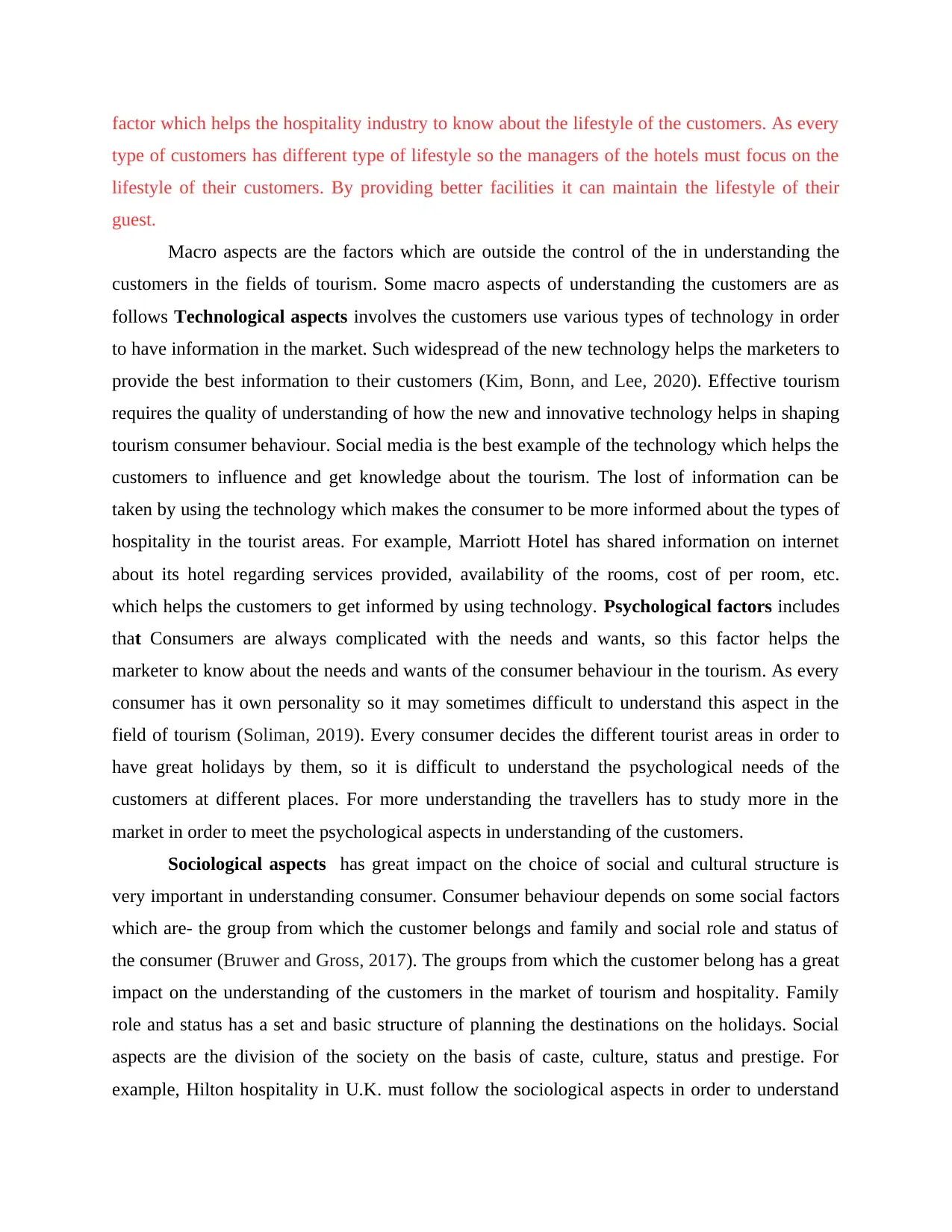
factor which helps the hospitality industry to know about the lifestyle of the customers. As every
type of customers has different type of lifestyle so the managers of the hotels must focus on the
lifestyle of their customers. By providing better facilities it can maintain the lifestyle of their
guest.
Macro aspects are the factors which are outside the control of the in understanding the
customers in the fields of tourism. Some macro aspects of understanding the customers are as
follows Technological aspects involves the customers use various types of technology in order
to have information in the market. Such widespread of the new technology helps the marketers to
provide the best information to their customers (Kim, Bonn, and Lee, 2020). Effective tourism
requires the quality of understanding of how the new and innovative technology helps in shaping
tourism consumer behaviour. Social media is the best example of the technology which helps the
customers to influence and get knowledge about the tourism. The lost of information can be
taken by using the technology which makes the consumer to be more informed about the types of
hospitality in the tourist areas. For example, Marriott Hotel has shared information on internet
about its hotel regarding services provided, availability of the rooms, cost of per room, etc.
which helps the customers to get informed by using technology. Psychological factors includes
that Consumers are always complicated with the needs and wants, so this factor helps the
marketer to know about the needs and wants of the consumer behaviour in the tourism. As every
consumer has it own personality so it may sometimes difficult to understand this aspect in the
field of tourism (Soliman, 2019). Every consumer decides the different tourist areas in order to
have great holidays by them, so it is difficult to understand the psychological needs of the
customers at different places. For more understanding the travellers has to study more in the
market in order to meet the psychological aspects in understanding of the customers.
Sociological aspects has great impact on the choice of social and cultural structure is
very important in understanding consumer. Consumer behaviour depends on some social factors
which are- the group from which the customer belongs and family and social role and status of
the consumer (Bruwer and Gross, 2017). The groups from which the customer belong has a great
impact on the understanding of the customers in the market of tourism and hospitality. Family
role and status has a set and basic structure of planning the destinations on the holidays. Social
aspects are the division of the society on the basis of caste, culture, status and prestige. For
example, Hilton hospitality in U.K. must follow the sociological aspects in order to understand
type of customers has different type of lifestyle so the managers of the hotels must focus on the
lifestyle of their customers. By providing better facilities it can maintain the lifestyle of their
guest.
Macro aspects are the factors which are outside the control of the in understanding the
customers in the fields of tourism. Some macro aspects of understanding the customers are as
follows Technological aspects involves the customers use various types of technology in order
to have information in the market. Such widespread of the new technology helps the marketers to
provide the best information to their customers (Kim, Bonn, and Lee, 2020). Effective tourism
requires the quality of understanding of how the new and innovative technology helps in shaping
tourism consumer behaviour. Social media is the best example of the technology which helps the
customers to influence and get knowledge about the tourism. The lost of information can be
taken by using the technology which makes the consumer to be more informed about the types of
hospitality in the tourist areas. For example, Marriott Hotel has shared information on internet
about its hotel regarding services provided, availability of the rooms, cost of per room, etc.
which helps the customers to get informed by using technology. Psychological factors includes
that Consumers are always complicated with the needs and wants, so this factor helps the
marketer to know about the needs and wants of the consumer behaviour in the tourism. As every
consumer has it own personality so it may sometimes difficult to understand this aspect in the
field of tourism (Soliman, 2019). Every consumer decides the different tourist areas in order to
have great holidays by them, so it is difficult to understand the psychological needs of the
customers at different places. For more understanding the travellers has to study more in the
market in order to meet the psychological aspects in understanding of the customers.
Sociological aspects has great impact on the choice of social and cultural structure is
very important in understanding consumer. Consumer behaviour depends on some social factors
which are- the group from which the customer belongs and family and social role and status of
the consumer (Bruwer and Gross, 2017). The groups from which the customer belong has a great
impact on the understanding of the customers in the market of tourism and hospitality. Family
role and status has a set and basic structure of planning the destinations on the holidays. Social
aspects are the division of the society on the basis of caste, culture, status and prestige. For
example, Hilton hospitality in U.K. must follow the sociological aspects in order to understand
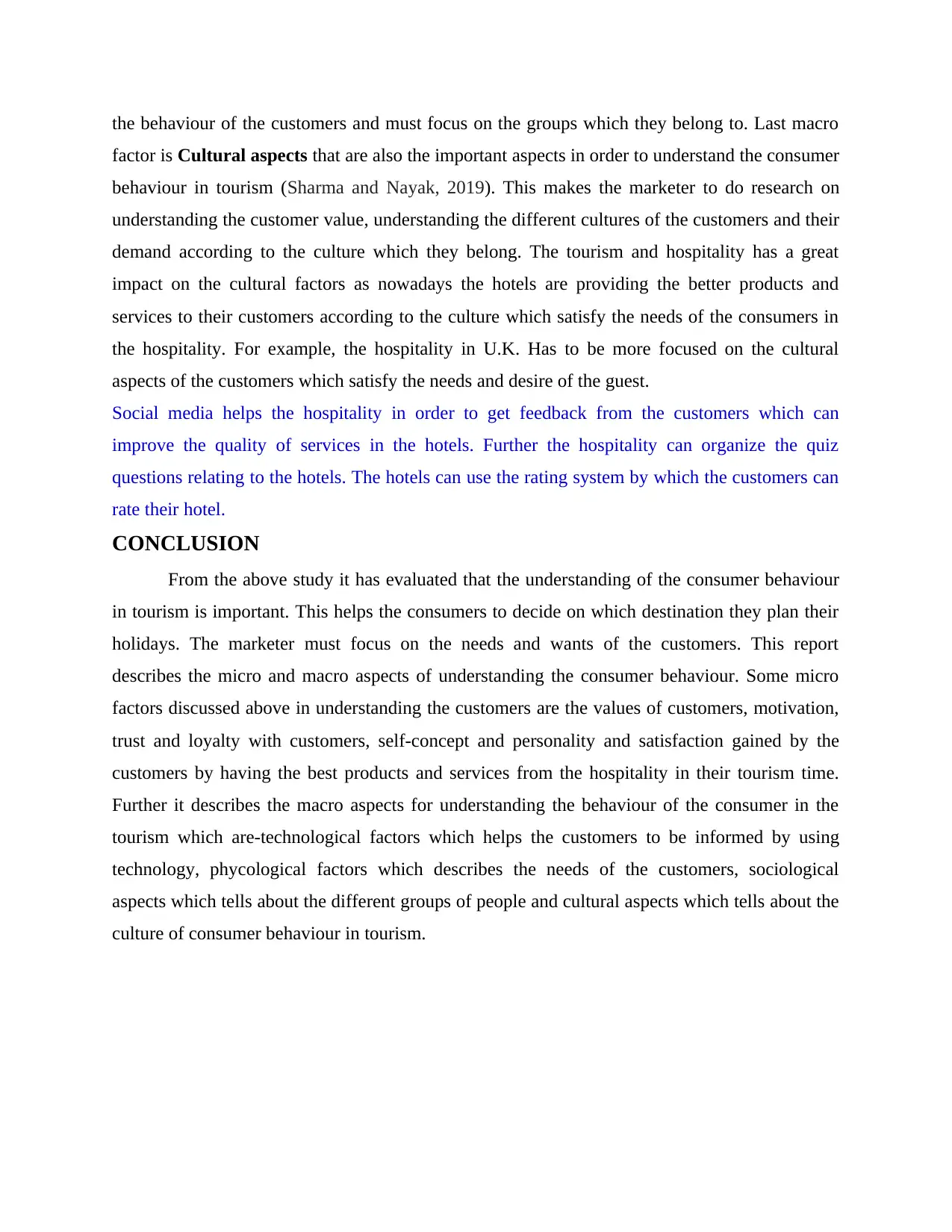
the behaviour of the customers and must focus on the groups which they belong to. Last macro
factor is Cultural aspects that are also the important aspects in order to understand the consumer
behaviour in tourism (Sharma and Nayak, 2019). This makes the marketer to do research on
understanding the customer value, understanding the different cultures of the customers and their
demand according to the culture which they belong. The tourism and hospitality has a great
impact on the cultural factors as nowadays the hotels are providing the better products and
services to their customers according to the culture which satisfy the needs of the consumers in
the hospitality. For example, the hospitality in U.K. Has to be more focused on the cultural
aspects of the customers which satisfy the needs and desire of the guest.
Social media helps the hospitality in order to get feedback from the customers which can
improve the quality of services in the hotels. Further the hospitality can organize the quiz
questions relating to the hotels. The hotels can use the rating system by which the customers can
rate their hotel.
CONCLUSION
From the above study it has evaluated that the understanding of the consumer behaviour
in tourism is important. This helps the consumers to decide on which destination they plan their
holidays. The marketer must focus on the needs and wants of the customers. This report
describes the micro and macro aspects of understanding the consumer behaviour. Some micro
factors discussed above in understanding the customers are the values of customers, motivation,
trust and loyalty with customers, self-concept and personality and satisfaction gained by the
customers by having the best products and services from the hospitality in their tourism time.
Further it describes the macro aspects for understanding the behaviour of the consumer in the
tourism which are-technological factors which helps the customers to be informed by using
technology, phycological factors which describes the needs of the customers, sociological
aspects which tells about the different groups of people and cultural aspects which tells about the
culture of consumer behaviour in tourism.
factor is Cultural aspects that are also the important aspects in order to understand the consumer
behaviour in tourism (Sharma and Nayak, 2019). This makes the marketer to do research on
understanding the customer value, understanding the different cultures of the customers and their
demand according to the culture which they belong. The tourism and hospitality has a great
impact on the cultural factors as nowadays the hotels are providing the better products and
services to their customers according to the culture which satisfy the needs of the consumers in
the hospitality. For example, the hospitality in U.K. Has to be more focused on the cultural
aspects of the customers which satisfy the needs and desire of the guest.
Social media helps the hospitality in order to get feedback from the customers which can
improve the quality of services in the hotels. Further the hospitality can organize the quiz
questions relating to the hotels. The hotels can use the rating system by which the customers can
rate their hotel.
CONCLUSION
From the above study it has evaluated that the understanding of the consumer behaviour
in tourism is important. This helps the consumers to decide on which destination they plan their
holidays. The marketer must focus on the needs and wants of the customers. This report
describes the micro and macro aspects of understanding the consumer behaviour. Some micro
factors discussed above in understanding the customers are the values of customers, motivation,
trust and loyalty with customers, self-concept and personality and satisfaction gained by the
customers by having the best products and services from the hospitality in their tourism time.
Further it describes the macro aspects for understanding the behaviour of the consumer in the
tourism which are-technological factors which helps the customers to be informed by using
technology, phycological factors which describes the needs of the customers, sociological
aspects which tells about the different groups of people and cultural aspects which tells about the
culture of consumer behaviour in tourism.
⊘ This is a preview!⊘
Do you want full access?
Subscribe today to unlock all pages.

Trusted by 1+ million students worldwide

Paraphrase This Document
Need a fresh take? Get an instant paraphrase of this document with our AI Paraphraser
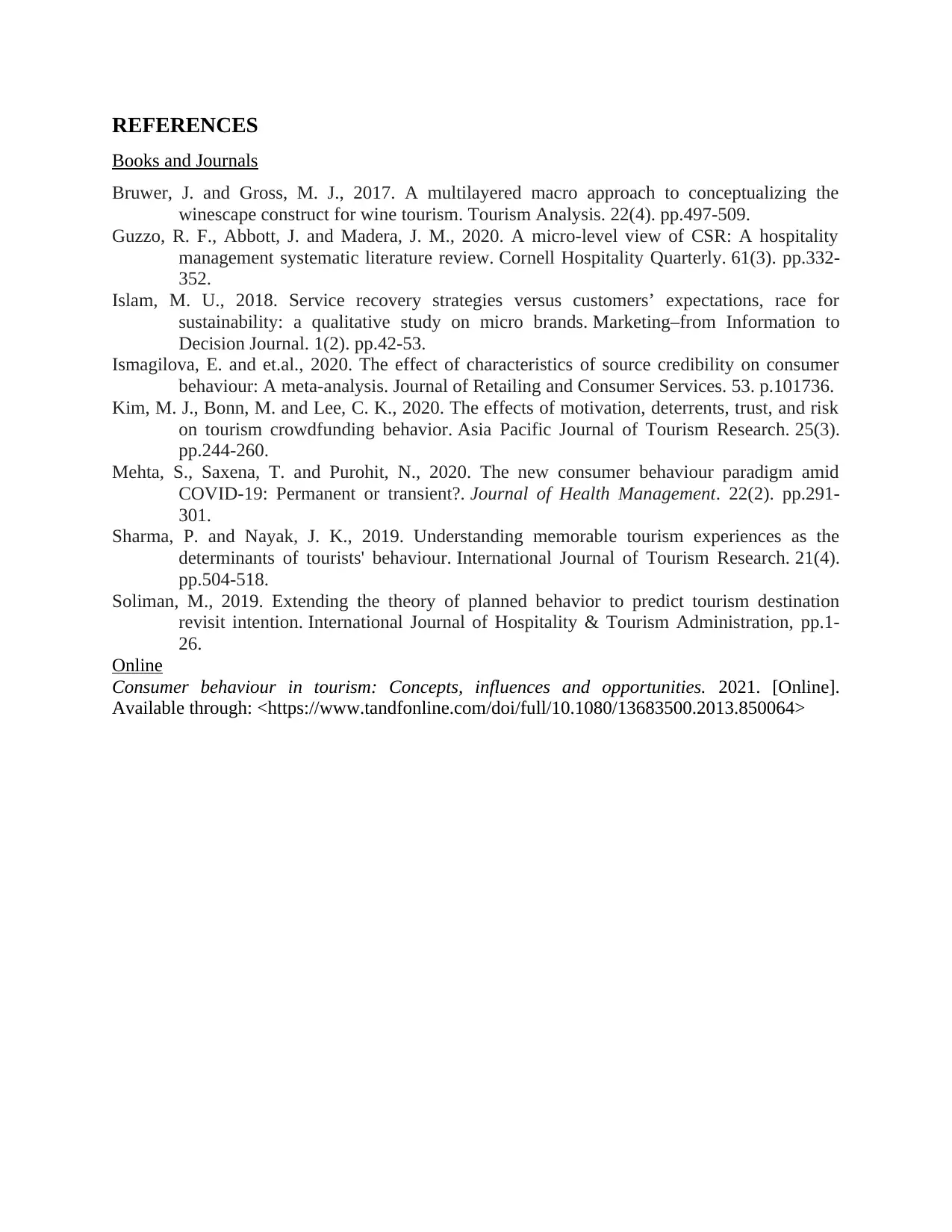
REFERENCES
Books and Journals
Bruwer, J. and Gross, M. J., 2017. A multilayered macro approach to conceptualizing the
winescape construct for wine tourism. Tourism Analysis. 22(4). pp.497-509.
Guzzo, R. F., Abbott, J. and Madera, J. M., 2020. A micro-level view of CSR: A hospitality
management systematic literature review. Cornell Hospitality Quarterly. 61(3). pp.332-
352.
Islam, M. U., 2018. Service recovery strategies versus customers’ expectations, race for
sustainability: a qualitative study on micro brands. Marketing–from Information to
Decision Journal. 1(2). pp.42-53.
Ismagilova, E. and et.al., 2020. The effect of characteristics of source credibility on consumer
behaviour: A meta-analysis. Journal of Retailing and Consumer Services. 53. p.101736.
Kim, M. J., Bonn, M. and Lee, C. K., 2020. The effects of motivation, deterrents, trust, and risk
on tourism crowdfunding behavior. Asia Pacific Journal of Tourism Research. 25(3).
pp.244-260.
Mehta, S., Saxena, T. and Purohit, N., 2020. The new consumer behaviour paradigm amid
COVID-19: Permanent or transient?. Journal of Health Management. 22(2). pp.291-
301.
Sharma, P. and Nayak, J. K., 2019. Understanding memorable tourism experiences as the
determinants of tourists' behaviour. International Journal of Tourism Research. 21(4).
pp.504-518.
Soliman, M., 2019. Extending the theory of planned behavior to predict tourism destination
revisit intention. International Journal of Hospitality & Tourism Administration, pp.1-
26.
Online
Consumer behaviour in tourism: Concepts, influences and opportunities. 2021. [Online].
Available through: <https://www.tandfonline.com/doi/full/10.1080/13683500.2013.850064>
Books and Journals
Bruwer, J. and Gross, M. J., 2017. A multilayered macro approach to conceptualizing the
winescape construct for wine tourism. Tourism Analysis. 22(4). pp.497-509.
Guzzo, R. F., Abbott, J. and Madera, J. M., 2020. A micro-level view of CSR: A hospitality
management systematic literature review. Cornell Hospitality Quarterly. 61(3). pp.332-
352.
Islam, M. U., 2018. Service recovery strategies versus customers’ expectations, race for
sustainability: a qualitative study on micro brands. Marketing–from Information to
Decision Journal. 1(2). pp.42-53.
Ismagilova, E. and et.al., 2020. The effect of characteristics of source credibility on consumer
behaviour: A meta-analysis. Journal of Retailing and Consumer Services. 53. p.101736.
Kim, M. J., Bonn, M. and Lee, C. K., 2020. The effects of motivation, deterrents, trust, and risk
on tourism crowdfunding behavior. Asia Pacific Journal of Tourism Research. 25(3).
pp.244-260.
Mehta, S., Saxena, T. and Purohit, N., 2020. The new consumer behaviour paradigm amid
COVID-19: Permanent or transient?. Journal of Health Management. 22(2). pp.291-
301.
Sharma, P. and Nayak, J. K., 2019. Understanding memorable tourism experiences as the
determinants of tourists' behaviour. International Journal of Tourism Research. 21(4).
pp.504-518.
Soliman, M., 2019. Extending the theory of planned behavior to predict tourism destination
revisit intention. International Journal of Hospitality & Tourism Administration, pp.1-
26.
Online
Consumer behaviour in tourism: Concepts, influences and opportunities. 2021. [Online].
Available through: <https://www.tandfonline.com/doi/full/10.1080/13683500.2013.850064>
1 out of 8
Related Documents
Your All-in-One AI-Powered Toolkit for Academic Success.
+13062052269
info@desklib.com
Available 24*7 on WhatsApp / Email
![[object Object]](/_next/static/media/star-bottom.7253800d.svg)
Unlock your academic potential
Copyright © 2020–2026 A2Z Services. All Rights Reserved. Developed and managed by ZUCOL.


